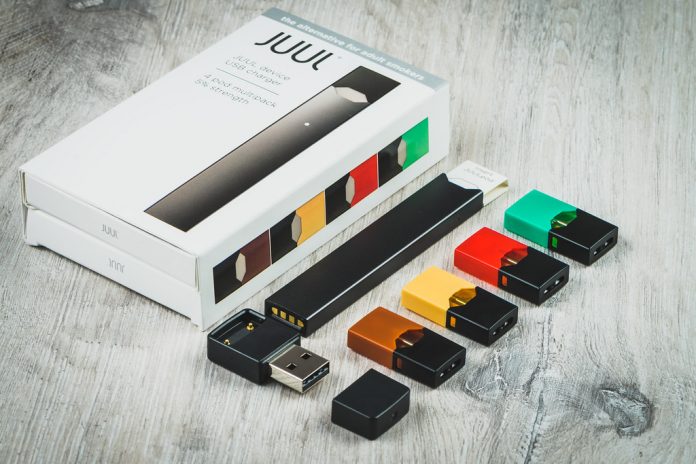By Veronique de Rugy
There’s something terrifying about a government so powerful that it can shut down your business overnight without even bothering to offer substantive arguments. Yet that’s what Food and Drug Administration bureaucrats just did to the e-cigarette company Juul. While Juul got a stay of execution from a court, the company is one of the many victims of the FDA’s counterproductive war on nicotine. Most of the other victims will be cigarette smokers.
I have followed the issue for several years and there is no doubt in my mind that Juul is an effective way to transition away from smoking into alternative, safer sources of nicotine. Vaping doesn’t end nicotine consumption, but it’s still a real step toward a world without cigarettes. In fact, it is now proven that e-cigarettes are more effective than traditional, FDA-approved nicotine-replacement therapies at getting smokers to quit entirely.
In its 125,000-page application to the FDA, Juul reminded the agency of more than 110 studies showing the benefits of e-cigarettes over traditional nicotine consumption. The company has also been a good team player, jumping through all the hoops thrown at it by the anti-vaping brigades. As the Reason Foundation’s Guy Bentley reminds us in the Daily News, “Juul complied with nearly every request made by critics including pulling its original marketing campaigns in 2016, voluntarily removing all of its non-tobacco and menthol flavors from the market in 2019, and supporting an increase in the tobacco age from 18 to 21.”
And yet the FDA has ordered all Juul e-cigarette products off the market even though its own decision features this remarkable admission: “To date, the FDA has not received clinical information to suggest an immediate hazard associated with the use of the JUUL device or JUULpods.” In other words, neither Juul’s effectiveness in turning smokers away from more dangerous products nor its success at getting some smokers to quit altogether is, for the FDA, sufficient evidence of the product’s benefit to public health.
Don’t hold your breath waiting for good arguments coming from the FDA. The Competitive Enterprise Institute’s Michelle Minton writes that “the FDA’s rationale that Juul products lacked sufficient toxicological evidence is confusing, given that the agency has previously approved IQOS heated tobacco products and lower-nicotine content combustible cigarettes, ‘both of which obviously have worse (toxicological) profiles than a Juul.'” She adds that “the FDA has granted marketing approval for other e-cigarette brands” despite these products being no safer.
As for concerns over kids’ nicotine use, the FDA’s decision comes at a time when Juul is no longer the most popular vaping product among young people and when vaping is becoming remarkably less popular among the young. Bentley notes, for instance, that “According to the latest National Youth Tobacco Survey, 89% of (high school age) youth don’t vape and 95% don’t vape frequently.” Meanwhile, in the Centers for Disease Control’s latest data, only 7.6% of high school and middle school students reported any past-month vaping, down from 27.5% in 2019.
Instead of applauding the improvements, the agency has continued to wage a war on nicotine. This war includes, among other measures, rules to ban vapers’ favorite flavors and reduce nicotine in cigarettes to trace amounts. However, in the absence of the most popular alternative, Juul, the FDA all but guarantees that smokers will smoke more cigarettes, turn to less-established products or even go to the black market to get their nicotine fixes.
The FDA has forgotten why it entered the battlefield in the first place. Every year in the United States, 480,000 people die due to cigarette smoking. They die of illnesses caused by the repeated inhaling of tar, an especially dangerous product of combustion. And here’s the key point: They may be smoking for the buzz of nicotine, but they don’t die from nicotine. This simple fact explains why e-cigarettes came to be. The importance of the innovation lays precisely in its ability to deliver nicotine without the combustion and tar.
All wars kill. The FDA’s war against nicotine might claim Juul, but it will just as likely claim hundreds of thousands of adults who continue to inhale tar from cigarettes thanks to the agency’s refusal to allow safer, but also appealing, alternatives. If these overzealous regulators win their battle against Juul, the only other winners will be tobacco companies, contraband dealers and health-care providers who will have to keep treating captive smokers.
Veronique de Rugy is the George Gibbs Chair in Political Economy and a senior research fellow at the Mercatus Center at George Mason University. To find out more about Veronique de Rugy and read features by other Creators Syndicate writers and cartoonists, visit the Creators Syndicate Web page at www.creators.com.
COPYRIGHT 2022 CREATORS.COM.
More great content from Health Care News










